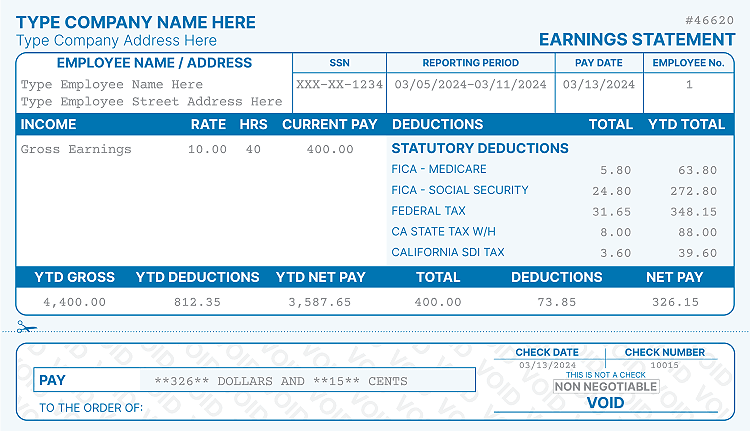Federal Tax Deposits (FTD) Meaning on Paystubs

If "FTD" on your paystub catches your eyes, it stands for Federal Tax Deposits. These are the amounts withheld from an employee’s paycheck and deposited by the employer to cover federal taxes, including income tax, Social Security, and Medicare. Employers are also responsible for paying a portion of these taxes themselves. Let’s dive into what exactly does FTD on paystub mean, and why is it important?
Key Takeaways for Federal Tax Deposit
- "FTD" stands for Federal Tax Deposit, representing your employer's payments of withheld income tax and FICA taxes to the IRS.
- While "FTD" may not be explicitly on your paystub, the individual tax deductions (federal income tax, Social Security, and Medicare) represent the components of the FTD.
- Understanding FTDs helps you grasp how your taxes contribute to essential government services.
- Your employer is responsible for managing and depositing FTDs correctly and on time.
What are Federal Tax Deposits (FTDs)
FTDs play a crucial role in funding government programs. They primarily consist of:
- Withholding taxes (income tax and FICA taxes) deducted from employee wages.
- Employer’s share of FICA (Social Security and Medicare).
- Unemployment tax (FUTA), which is entirely employer-funded.
Employers must ensure these deposits are made on time via Electronic Federal Tax Payment System (EFTPS) or other approved methods. Late or missing deposits result in penalties, which can range from 2% to 15% of the unpaid tax, depending on the delay.
How FTDs Appear on Your Paystub
While "FTD" itself might not be explicitly listed on your paystub, the components that make up the FTD will be. You'll typically see deductions for:
- Federal Income Tax: This is the amount withheld from your wages based on the W-4 form you submitted to your employer.
- Social Security Tax: This is currently 6.2% of your gross wages.
- Medicare Tax: This is currently 1.45% of your gross wages.
These deductions are then remitted to the IRS by your employer as part of their FTD responsibilities.
How Often Do Employers Deposit FTDs?
The deposit schedule for FTDs depends on the employer’s tax liability. Think of FTDs as the government's way of ensuring that employment taxes are paid regularly throughout the year, rather than in one lump sum at tax time.
FTD Deposit Schedules: Monthly vs. Semiweekly
The IRS mandates how frequently employers must make these deposits, based on their past tax liability.
|
Tax Liability (Lookback Period) |
FTD Deposit Schedules |
Deposit Due Date |
|
$50,000 or less |
Monthly |
By the 15th of the following month |
|
Exceeding $50,000 |
Semiweekly |
Wages paid Saturday–Tuesday are due Friday, and wages paid Wednesday–Friday are due Wednesday. |
|
$100,000 or more in a single day |
One-Day Rule |
Next business day |
-
Monthly Schedule Depositors
Employers with $50,000 or less in total employment taxes during the IRS lookback period are monthly schedule depositors and must deposit taxes by the 15th of the following month. For example, taxes withheld from paychecks issued in August must be deposited by September 15th.
Note: If the 15th falls on a weekend or a holiday, the deposit is due on the next business day.
Note 2: Lookback periods are the four quarters of the previous two calendar years.
-
Semiweekly Schedule Depositors
Employers exceeding $50,000 in total employment taxes are semiweekly schedule depositors and must deposit taxes within a few days of paying employees.
For wages paid Saturday, Sunday, Monday, or Tuesday, the deposit is due the following Friday. For wages paid Wednesday, Thursday, or Friday, the deposit is due the following Wednesday.
-
$100,000 One-Day Rule
If an employer’s tax liability reaches $100,000 or more in a single day, the deposit must be made by the next business day (this is called the $100,000 One-Day Rule).
Example: Imagine a large school district that has a significant payroll on March 15th. Due to bonuses and other payments, their total tax liability on that day exceeds $100,000. They must deposit the full amount by March 16th (assuming it's a business day) and will then be required to follow the semiweekly deposit schedule for the remainder of the year.
Teachers and FTDs: Special Considerations
If you’re a teacher, you might wonder why your paystub includes or doesn’t include FTD deductions. Teachers who are employed by public schools typically have federal taxes withheld, and their employers handle FTDs as required. However, if you’re working for a private institution, charter school, or as a freelance tutor, your tax obligations might be different.
What If I’m a Teacher But Don’t Have FTD?
Teachers who work as independent contractors (e.g., private tutors or adjunct faculty in some institutions) may not see FTDs on their paystubs. Instead, they’re responsible for making estimated tax payments directly to the IRS. If you fall into this category, you should:
- Use Form 1040-ES to calculate and submit quarterly estimated payments.
- Set aside at least 15.3% of earnings to cover self-employment taxes (Social Security and Medicare) in addition to income tax.
How Much Do Employers Deposit in FTDs?
Federal Tax Deposits make up a significant portion of government tax collections. According to the IRS, in recent years:
- FICA taxes (Social Security and Medicare) accounted for approximately $1.3 trillion in annual federal revenue.
- Employment taxes made up over 70% of total IRS collections, emphasizing the importance of timely FTD payments.
Conclusion
FTDs ensure that employees’ federal tax withholdings are properly collected and remitted to the IRS. Whether you’re an employee or an employer, understanding your responsibilities can help you avoid penalties and stay compliant with tax regulations. Teachers and independent contractors should pay extra attention to their tax obligations, ensuring they either have FTDs deducted or make estimated payments on time.
Kristen Larson is a payroll specialist with over 10 years of experience in the field. She received her Bachelor's degree in Business Administration from the University of Minnesota. Kristen has dedicated her career to helping organizations effectively manage their payroll processes with Real Check Stubs.

